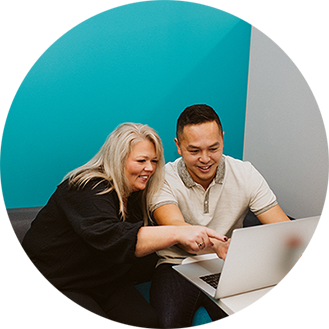
The Brain Fuel Experts You Need in Your Life: Dietitians
Mar 26, 2023
ResourcesArcora
A leading provider in Canadian mental well-being (EAP), coaching and business support solutions. Un fournisseur de premier plan au Canada de solutions de mieux-être mental (PAE), de coaching et de soutien à la gestion.While March is officially Nutrition month, there’s really no wrong time to get proactive about your dietary health. To give you a better understanding of the kinds of supports you can access through our assistance programs, we sat down with Registered Dietitian and Certified Diabetes Educator, Devon Guy—also a professional in our network—to talk about the work she does and all the many (excellent!) reasons you should connect with a dietitian.
Can you tell me what a dietitian is, and if there’s a difference between a dietitian and a nutritionist?
A Registered Dietitian (RD) is a regulated health professional similar to a Registered Nurse or other allied health professional. RDs must complete a formal university degree bachelor’s or master’s degree with an internship. A nutritionist learns about nutrition through self-study or formal education, but doesn’t meet the requirements to use the title RD. Giving nutrition advice without proper knowledge and training can be harmful, especially when providing counseling services to those with medical conditions.
What can someone expect when they see an RD?
When you connect with an RD, whether in-person, online or over the phone, your appointment will be about 45-60 minutes. During the appointment, your dietitian will ask you specific questions to better understand your physical and mental health and social/living situation. Questions may include:
- your medical history,
- any medications or supplements you take,
- your current habits and diet,
- cultural food and traditions you enjoy, and
- any challenges you have preparing or eating food.
You can expect to have this conversation, and any questions answered, in a non-judgemental, safe environment. Your RD will use the information you share to make an individualized nutritional assessment and a plan to help support you in achieving optimal health and reaching your nutrition-related goals.
As an RD, I look forward to these first appointments—meeting people, hearing their stories and getting them set up to achieve their goals—it’s one of the things I love about my job.
Sounds like fascinating work! Can you share some of the main reasons a person should see a dietitian?
You can see a dietitian for so many reasons—far more than just weight loss and meal plans! Here are a handful of the reasons you might choose to seek out an RD:
- You feel healthy but are curious to know that you’re on the right track and that what you’re eating is right for you and your health goals.
- You have digestive complaints including gas, bloating, constipation, diarrhea, stomach pain, heartburn and/or distensions.
- Your relationship with food needs rebuilding. Having a healthy relationship with food is one of the most important ways to support health through nutrition. If you ever feel guilty after eating, feel out of control with your intake, food choices or portions sizes, your relationship with food may need some support.
- You want to improve your sport, endurance or athletic performance.
- You have a lack of or an insatiable appetite. You always (or never) feel hunger. Hunger should be normalized and recognizable, many of us ignore hunger and full signals for so long that we lose touch with what it means, physiologically, to be hungry or full.
- You’re pregnant, thinking about becoming pregnant, breastfeeding or wanting support in raising healthy eaters.
- You want help with meal planning.
- You’ve had abnormal blood work (kidney function, liver enzymes, cholesterol, blood sugar, stress hormones, thyroid hormones, inflammatory markers, nutrient-related deficiencies, etc.) and want to explore how nutrition can help.
- You have a diagnosed or suspected food intolerances, allergies or hypersensitivities.
- You’ve been diagnosed with a chronic disease such as diabetes, heart disease, cancer, autoimmune disease, IBS, high blood pressure, high cholesterol, kidney disease, or you have significant family history of chronic disease, and you’d like to prevent a diagnosis.
- You want to manage your body weight—either losing weight or gaining lean body mass.
- You want to improve your health outcomes, reduce risk of disease, feel more energized and youthful, reduce inflammation and reduce chronic pain.
- You want to use food as medicine to manage or prevent a chronic condition, reduce or avoid the need for medications and feel at your optimal health and wellness.
- You want to change a food or lifestyle behavior or habit. RDs are trained in motivational interviewing and cognitive behavior change therapies and are often skilled health, vitality or life coaches.
That’s quite a list! Mental health is so important to us at Arcora and to our clients. Do you think there’s a connection between nutrition and mental health?
The relationship between diet and mental health is complex. Research shows a strong link between what we eat and how we feel. Our brain works hard to take care of our thoughts, movement, breathing and our senses and requires a constant supply of fuel (food) to do that. So, what we eat directly impacts the structure and function of our brain and consequently our mood.
Like an expensive car, our brain functions best with high quality fuel. Getting plenty of vitamins, minerals and antioxidants nourishes and protects our body and brain from stress and damage. Poor nutrition—diets high in refined sugars and processed foods—have been shown to impair brain function and even worsen mood disorders like depression.
An RD can help you optimize your diet to help you to feel better not only physically, but mentally and emotionally as well.
Payworks understands the importance of the health and well-being of your workforce. That’s why we’ve partnered with Arcora to create HR Advisory Services, a comprehensive management tool of practical HR-related guidance, resources and services provided by industry professionals to ensure you’re supported every step of the way in growing a strong organization. This includes a confidential employee counselling referral, which provides private counselling to help get your team members back on track. For more information on HR, legal and financial guidance your business (and employees) can count on, visit: https://www.payworks.ca/solutions/hr-advisory-services.
These articles are produced by Payworks as an information service. They are not intended to substitute professional legal, regulatory, tax, or financial advice. Readers must rely on their own advisors, as applicable, for such advice.













